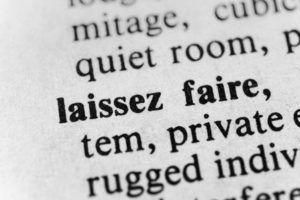What does Laissez-faire mean in relation to economy? *
What is Laissez-faire?
Laissez-faire is a French phrase that translates to "let to exercise." Information technology refers to a political ideology that rejects the exercise of government intervention in an economic system. Further, the state is seen as an obstacle to economic growth and development .
The term originated in the 18th century during the Industrial Revolution. French industrialists used the term in response to the French government's voluntary aid to promote business. The phrase is traditionally attributed to French man of affairs M. Le Gendre from when he responded to a Mercantilist minister, Jean-Baptiste Colbert.

The laissez-faire theory mainly advocates government non-intervention. Economical theorist Adam Smith believed that the optimal functioning of markets needed minimal authorities intervention. However, Smith did raise concerns most the drawbacks of the theory, peculiarly in relation to the possibility of creating an indolent, lazy, but financially powerful feudal class.
Basic Principles of a Laissez-faire Economy
- The individual is the basic unit in society, i.eastward., the standard of measurement in social calculus.
- The individual enjoys a natural correct to freedom.
- The concrete club of nature is a harmonious and cocky-regulating organisation.
The basic purpose of the laissez-faire economy is to promote a free and competitive market that demands the restoration of the social club and natural state of liberty that humans emerged from. A laissez-faire economic system is thus characterized by the free motility of forces of supply and demand, gratuitous from whatsoever form of intervention by a government, a price-setting monopoly, or whatever other authority.
Forms of Authorities Intervention
Government intervention tin can occur through the following:
1. Protectionism
Protectionism refers to any government regulation or policy that limits international trade. Protectionist policies foster domestic production and assist the working class, only are detrimental to the overall growth rate of the economy, as they hinder competition.
ii. Antitrust laws
Antitrust laws oppose monopolies , trusts, and other organizations or practices that don't allow higher participation from potential entrepreneurs. While such laws seem to add to the concept of laissez-faire, they get against the Darwinist thought of survival of the fittest that laissez-faire prescribes.
Laissez-faire policies serve as a motivation for the producer to hone its products in response to the standards gear up by the market place. The toll organization is such that the output and consumption levels are solely determined by the varied decisions fabricated by households and firms through transactions in the market place.
Advantages of Laissez-faire
Laissez-faire offers the following benefits:
i. Autonomy
A laissez-faire economy gives businesses more space and autonomy from government rules and regulations that would make business activities harder and more difficult to proceed. Such an environment makes it more than viable for companies to take risks and invest in the economic system. Moreover, it provides companies with a greater incentive to endeavour and maximize profits.
2. Innovation
Driven by the demand to provide their products with market advantage, companies are compelled to be more creative and innovative in their approach. The practice leads to technological advocacy in addition to economic growth.
iii. Absence of taxes
Lastly, the absence of taxes leaves companies and employees alike with greater spending power. It also discourages corruption that can arise every bit a issue of bureaucrats with limited cognition simply immense regulatory power.
Disadvantages of Laissez-faire
Along with its advantages, a laissez-faire economic system comes with a few drawbacks:
1. Income inequality
According to Thomas Hobbes, the presence of absolute autonomy in a state-of-nature economy creates a situation of chaos for both producers and consumers. Such an economic system tin pb to inequality of income and wealth that may contribute to a vicious cycle wherein inheritance plays a central role in financial placement within social club. Equally put frontwards by Adam Smith, monopolies can emerge wherein they control supply, charge college prices, and pay lower wages to workers.
2. Failure to represent the interests of the entire society
A laissez-faire economy fails to be representative of the interests of all sections of a society; it may cater but to the bulk or the affluent grade. Thereby, public goods with positive externalities such as education and healthcare may non be equally distributed in gild, whereas appurtenances with negative externalities may exist over-consumed.
Laissez-faire is now more an describing word to denote the prevalence of its associated features. In isolation, the economic theory can lead to huge gaps in wealth, injustices, and in some cases, recession. In the late 19th century, near economies in the West were dominated by liberal policies encouraged by laissez-faire.
Final Discussion
Laissez-faire alone is non enough to guide an economy, but with a proper balance between the power given to the regime and freedom of marketplace forces, economies can flourish with minimized risks.
More Resources
CFI is the official provider of the Financial Modeling and Valuation Analyst (FMVA)® certification program, designed to transform anyone into a earth-class financial analyst.
To keep learning and developing your knowledge of fiscal assay, we highly recommend the additional CFI resource beneath:
- Expansionary Monetary Policy
- Marketplace Economy
- Socialism vs. Capitalism
- Trade Efficiency Dominion
Source: https://corporatefinanceinstitute.com/resources/knowledge/economics/laissez-faire/
0 Response to "What does Laissez-faire mean in relation to economy? *"
Postar um comentário